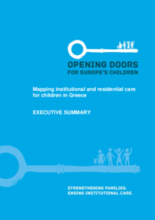To better understand the situation of children in institutional care in Greece, Roots Research Centre, the national coordinator of Opening Doors for Europe's Children, conducted the first nation-wide mapping of institutional and residential care in Greece. The study revealed "a patchwork" of public and private institutions and residential care facilities with little or no oversight of quality and no monitoring of the numbers of children and what happens to them. The mapping identified 85 institutions across Greece caring for an estimated 2,825 children, including those placed through the child protection system and children with disabilities. Only two institutions appeared to have fewer than ten children, while most were estimated to house around 30 children. Thus, few institutions appear to comply with the UN Guidelines for the Alternative Care of Children which recommends that residential settings are small, organised around the rights and needs of children and reflect as close as possible a family or small group situation. While institutionalisation before the age of 3 is widely acknowledged to be particularly damaging to children’s development, in Greece 182 children in institutional care were babies and toddlers aged 0-3 according to the mapping.
Only 309 children in care in Greece were living with foster carers in 2014, and Roots Research Centre recommends that new legislation is needed to reduce the procedural burden of foster care, to raise public awareness, and to provide training and supervision of foster carers. The mapping also revealed a lack of financial, psychological or educational support programmes that would facilitate young people’s transition to independent life.
Additional facts and figures relevant to the country snapshot can be found here: http://www.openingdoors.eu/wp-content/uploads/2015/09/country-fiche-Gre…

